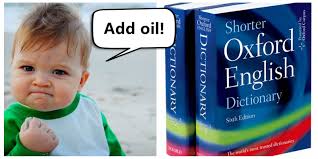(单词翻译:单击)
中式英语是大家避之不及的难题,但最近中文直译的 “add oil”竟然被纳入了牛津词典,今天的节目就要聊一聊那些反客为主的中式英语。
“Add oil”转正
牛津词典在最近一次的季度更新中,将中文直译的加油“add oil”收入英语词库。
Add oil: 加油
“Add oil” has made it into the Oxford English Dictionary: “add oil”被收入到牛津英语词典
“Made it”是一个用途十分广泛的表达:
I made it! 我成功了!
He's finally made it! 他终于成功了!
或是客人最终应邀来参加你的dinner party,你可以说:
You made it! 你来了!
和“add oil”类似,很多表达原本都不是标准英语,但在不同语言沟通交流的时候逐渐被英语国家的人广泛使用:
Pidgin English: /ˈpɪdʒ.ɪn/ 皮钦英语,洋泾滨语
为了反应语言实际使用的真实情况,牛津英语词典会定期更新词库,收录不同领域和语境下的单词和词义:
OED = Oxford English Dictionary: 牛津英语词典
How does a word get into the OED?
牛津英语词典如何收录单词?
1.这个单词必须被使用足够长的时间:至少10年
Sufficient: 足够的,充分的
Reasonable: 合理的
According to Oxford University Press, a word must require sufficient independent examples of use over a “reasonable amount of time” to be considered for inclusion.
牛津大学出版社表示,一个单词需要有充足的单独使用实例,经过合理的足够时间的考验,才会被考虑纳入词典。
Citation: 文内引用
"It depends on the accumulation of a large body of published (preferably printed) citations showing the word in actual use over a period of at least 10 years." according to the publisher.
“取决于这个词在已出版的刊物中被引用次数的积累量,表明它至少在10年里被真实地使用。”出版人如是说。
2.被大众广泛接受和熟知。
Currency: 流通
The publishers also consider whether the word has reached a "level of general currency", that is, understood by readers without the need of an explanation of its meaning.
单词的通用程度也被纳入考量的标准之一,也就是说,单词的意思被读者熟知,不需要另外解释。
The authority and legitimacy of language comes from its users.
语言的权威性和合理性应当来源于它的使用者。
外来词
其实英语中还有很多来自中国的外来词:
Loanwords: 外来词
Ketchup: 番茄酱,经马来语“kicap”从中国传入美国
Fengshui: 风水。
很多外国人会把Fengshui用作动词:
I need to fengshui my apartment. 我需要找人看看公寓的风水。
来自广东话“速速”:
Chop-chop: 快一点
Chop-chop, we're late! 快一点,我们迟到了!
来自“工合”,工业合作社的简称:
Gung-ho: /ˌɡʌŋˈhoʊ/ very enthusiastic and energetic 充满干劲的。
No matter how gung-ho you are when you start, you will tire. 不管你开始的时候多有热情,你都会疲惫的。
来自中文“扣头”:
Kowtow: /ˌkaʊˈtaʊ/ 卑躬屈膝
In fact, one cannot kowtow to both arguments.事实上,一个人不可能同时认同两种观点。
英语怎么加油?
了解add oil之后,你还记得加油的其它说法吗?我们来回顾一下“加油”更加常用的说法。
观看球赛时给支持的球队加油:
Come on!
朋友明天参加一场重要的考试:
You can do it!
You're gonna ace it!
如果某件事情已经做得很好,希望他再接再厉:
Keep it up!
其它的说法:
Let's go!
Give it your all!
说加油时人们往往会通过连读增强语气:
C'mon /kəˈmɑːn/ = Come on!
Go get'em /'getəm/ = Go get them!


